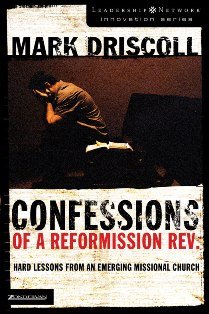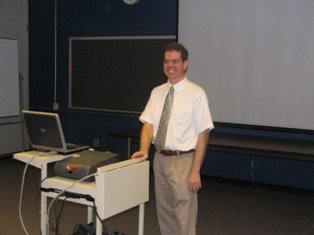I wrote the following short essay a number of years ago. Recently, I found it floating aimlessly around the internet and decided to bring it back home. I'm posting it today after reading someone who posed a variety of questions on
http://42lue.blogspot.com - you might want to read the questions on his site (the July 8 post) before reading my thoughts, below.
Why should you believe the Christian faith?
We believe that Christianity is not only reasonable, but it is indeed the best explanation for the world in which we live. It most consistently accounts for beauty, truth, sin and evil, human personality, meaning, concepts of right and wrong, science, and more. In this short essay, I seek to show you how the Christian world view is able to make sense of sin and evil.
This is only one example of the way that Christianity provides us with the answers we are looking for ‑‑ in fact, the answers we often don't want to hear. This is not a complete argument for the existence of God or of Christianity; it is a starting point for discussion. I welcome you to send your comments after you read.
Sin and Evil: Two Choices
The word sin is not used much anymore, but the word "evil" is. It is a word that we reserve for the worst human actions imaginable. Do you believe that what Hitler did to the Jews was evil? The Christian can say, "What Hitler did was absolutely evil." Can you? You may be surprised to find that you cannot.
Consider the thought, "It is wrong to mutilate my neighbor's child." Why is it wrong? Maybe it hurts the child and the parent, but why is hurting others wrong? Perhaps a billion people agree that it is wrong, but that is irrelevant to whether it is inherently wrong. Only God is the basis for any kind of absolutes, namely, absolute right and absolute wrong. Arguably, only a personal God ‑‑ a true, living God who is interested in the affairs of mankind ‑‑ is the basis for meaningful absolutes, because only a personal God will reward good and punish evil.
A major problem of the man who tries to think in a God‑free manner is that he naturally wants to think in categories of right and wrong. People want to determine good and evil, right and wrong. Admittedly, there are many today who claim that they hold to no standards of right and wrong, but in reality they continually attempt to make absolute statements. (Some examples of absolute statements: "It is wrong that he cut me off on the freeway," "It is good to eat this food," "All people deserve freedom," "All people do not deserve freedom," "There are no absolutes," etc.) Because there is no standard of right and wrong apart from God, the alleged God‑free person shows himself to be continually dependent upon the God he seeks to deny, thus affirming His existence.
The result of denying God is immorality and injustice. Having no "high" standard for right and wrong (God and His word), much lower standards are accepted. Here's an example of how God's word contains a much higher standard for right and wrong than everday human reasoning: God's word teaches, "Do nothing out of selfish ambition"; man apart from God has no reason to deny his appetite for wealth, power, sex, etc. God's word teaches, "Thou shalt not murder"; apart from God, man has no ultimate answer to the question, "Why is murder wrong?"
Sin and Evil: Two Illustrations
Allow me to illustrate this point with two illustrations. First: Following a debate regarding the existence of God, an atheist, Dr. Stein, was asked the question, "Why was Hitler's holocaust wrong, since the Nazis considered Jews to be non‑persons?" In other words, if morality is a matter of personal preference, why can't one group decide that it is not wrong to kill another group? Dr. Stein answered the question by appealing to tradition: "Hitler had no right to go against the consensus that had been established before him [in Germany] by its Judeo‑Christian heritage." This question, which begs for an absolute, receives none, because an atheist cannot simultaneously reject God and claim that murder is inherently wrong. Claiming that Hitler had "no right" to go against a consensus is still declaring an arbitrary absolute, and therefore begs the question. Until God is "allowed" into the reasoning process, the question can continually be asked: Says who?
Second: I decided to "try this at home." One day, I asked two seemingly intelligent men, "Why is murder out of hatred wrong?" The first said, "A feeling inside." The second, who to the best of my knowledge never met the first man, said the same thing, "A feeling inside." These men, who denied the certain existence of a personal God, had no absolute standard of right and wrong. If one claims that murdering out of hatred is wrong because of a feeling, another person can as easily claim that murdering out of hatred (or murdering for fun) is right because of a feeling. Until there is an absolute that transcends ourselves, reasoning is impossible.
A Basis for Morality
At this point, it should not be difficult to see how God‑free thinking leads to immorality. Autonomy has no basis for morality. Again, a vivid example of this is the holocaust, wherein a mass of people made their own decisions about right and wrong, and millions suffered unjustly as a result. The word "justice" does not even have meaning apart from the absolute standard of a God who declares what is right and wrong and therefore what is just and unjust.
Admittedly, religious people have also committed great injustices. All kinds of people have been immoral and unjust. There are non‑religious people who have been moral and just (at least in an outward sense). However, the question being asked here is: On what basis can a person determine what is right, wrong, just, or unjust? To answer these questions in any kind of meaningful, absolute way is to depend upon the transcendent God. One cannot meaningfully declare that murder out of religion" is wrong any more than one can meaningfully declare that murder out of hatred is wrong; both are absolute statements that depend upon the existence of an absolute standard ‑‑ God ‑‑ for their value.
 Life without electricity was a shadow of our former life. In a hot, dark room, we crouched around the battery-operated radio with poor reception, listening for news. It was hard to see the dial by the flickering light of the candles lined up on the table. Outside the neighbor’s generator whined. Occasionally a hot breeze would come through the open window. The candles would flicker in the air casting grotesque shadows on the walls. The only relief was a cold soda from the ice cooler. Outside the street was totally dark. Life without electricity was not life as it was meant to be.
Life without electricity was a shadow of our former life. In a hot, dark room, we crouched around the battery-operated radio with poor reception, listening for news. It was hard to see the dial by the flickering light of the candles lined up on the table. Outside the neighbor’s generator whined. Occasionally a hot breeze would come through the open window. The candles would flicker in the air casting grotesque shadows on the walls. The only relief was a cold soda from the ice cooler. Outside the street was totally dark. Life without electricity was not life as it was meant to be.






